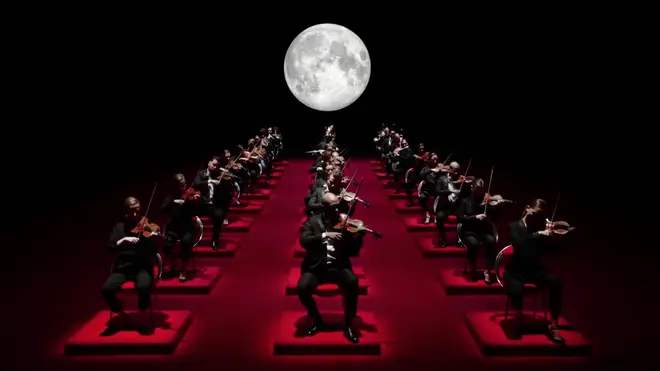On Air Now
Relaxing Evenings with Zeb Soanes 7pm - 10pm
22 October 2020, 16:24 | Updated: 22 October 2020, 16:36

Sit back, relax and enjoy these beautiful pieces of music in a lunar haze...
Why are there so many pieces of classical music inspired by the moon? Well, that friend in the sky causes our tides, determines the labelling of days into months and is even believed to master our moods (even when we’re not always conscious of it).
So it’s natural that the great composers of music’s history have turned their pen to our lunar neighbour: the exploration of such a powerful influence on human existence is inevitable in human expression.
From Debussy to Einaudi, here are some of the greatest composers who have written music about the moon.
Read more: Read more: 11 of the most relaxing pieces of piano music >
Debussy’s ‘Clair de lune’, from the Suite bergamasque for piano, is based on a poem set under the moonlight by the composer’s friend, poet Paul Verlaine.
“Your soul is a select landscape / Where charming masqueraders and bergamaskers [dancers] go…” the poem begins.
It’s the perfect fodder for setting music to, in fact, continuing with references to “playing the lute and dancing” and singing “in the minor key”, and song that “mingles with the moonlight.”
Beautiful words that led to the creation of beautiful music.

Pianist stuns with his passionate performance of Claire de lune
Another beautiful and instantly recognisable piano work, Beethoven’s famous ‘Moonlight’ Sonata carries somewhat of a misnomer.
For the Piano Sonata No. 14 wasn’t originally inspired by the moon at all, but actually named such by German music critic and poet Ludwig Rellstab, who in 1832 (five years after Beethoven's death), likened the effect of the first movement’s undulating triplets grounded by those stately, unhurried melody and bass lines to moonlight shining on Lake Lucerne in Switzerland.
We’re not sure what Beethoven would make of the posthumous interpretation of his Piano Sonata No. 14, but there’s no denying the name has stuck.

Pianist creates mesmerising visualisation of Beethoven’s Moonlight Sonata
‘Song to the Moon’ is the best-known aria from Romantic composer, Dvořák’s 1901 opera, Rusalka.
The story of a mermaid falling in love with a mere land-locked mortal, Rusalka’s most beloved moment comes in Act I, when she tells her merfather about her feelings, and that she wants to be a human.
She’s pointed in the direction of the local witch, and she sings to the moon, with the wish that the moon pass her beloved the message of her love.

Rusalka - 'Song to the Moon' (Dvořák; Kristine Opolais, The Royal Opera)
From the Day Three recording of Ludovico Einaudi’s Seven Days Walking collection of seven albums, ‘Full Moon’ is a wonderful minimalist work, featuring soft piano and mesmerising violin and cello drones underneath – for the utmost existential pondering.
There’s also a version of ‘Full Moon’ in Day Four and Day Five – reiterations on the piece’s first appearance in Day Three.
Read more: Ludovico Einaudi releases the final instalment of his seven-album project >

Einaudi: Full Moon (Day 3)
Romantic German song cycles are all about the existential soul wandering by babbling brooks and under vast skies, be that during the day or on dazzlingly moonlit nights.
... Like in Schumann’s Liederkreis, in which a protagonist singer has a dreamlike experience of wandering in nature during ‘Mondnacht’ from the song cycle.
“The voice alone cannot reproduce everything or produce every effect; together with the expression of the whole the finer details of the poem should also be emphasised; and all is well so long as the vocal line is not sacrificed,” Schumann said of his enduring song cycle, which was based on poetry by Joseph Eichendorff.

Robert Schumann - Liederkreis, op.39: Mondnacht
Judith Bingham OBE is a British composer known for her choral and church music.
‘Moon over Westminster’ is a transcription of her choral work ‘The Waning Moon’ for solo piano.
The moody piece does what it says on the tin, depicting Bingham’s night-time experience of a building she used to live close to.

The Moon Over Westminster Cathedral
If 20th-century serialism is your bag, Second Viennese School founder Arnold Schoenberg wrote his own moon-inspired music – all about a moon-inspired man.
Written for voice and flute, clarinet, violin, cello and piano, Pierrot Lunaire – or ‘Moonstruck Pierrot’ – is a 21-movement cycle of songs that tells the story of a wistful and woeful clown pulled from mood to mood by the fickle clutches of the moon.

Complete performance: Schoenberg's Pierrot lunaire